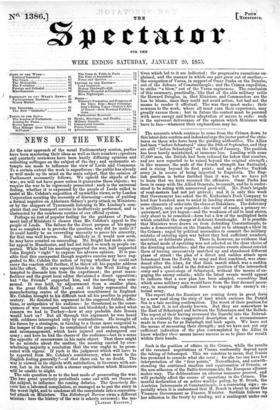NEWS OF THE WEEK.
Perhaps no test of popular feeling for the guidance of Parlia- ment and of Ministers is clearer than Mr. Cobden's appeal to the people of Leeds. The failure for the direct purpose of his appeal was so complete as to provoke the question, why did he make it ? It could hardly be an overruling necessity to prove his sincerity, for that was well known. But, unlikely as it would now seem, he may have counted on succeeding. Mr. Bright had made a simi- lar appeal to Manchester, and had not failed so much as people ex- pected. While half his meeting supported the war, half supported John Bright's q- right" to express his adverse opinion. It is pos- sible that this unexpected though negative success may have sug- gested to Mr. Cobden the notion of trying whether he could not carry the reaction still further, if he threw all his popular address into the effort. His own especial friends in the West Riding at- tempted to dissuade him from the 'experiment; the great manu- facturer and the great local editor threatened a direct opposition; but "the Friends" supported- him; and the meeting was sum- moned. It was held, by adjournment from a smaller place, in the great Cloth Hall Yard; and it fairly represented the manufacturing centre of the greatest constituency in England. Mr. Cobden brought to his difficult task all his practice in popular oratory. He directed his argument to the supposed foibles, affec- tions, or antipathies of his audience : he threatened as the conse- quences of war increased taxation and bloodshed; he asked what concern we had in Turkey—how at any probable date Russia would hurt us ? But all through this argument he was heard with coldness interrupted only by contradiction. He brought off Ins forces by a stratagem, in turning to a theme more congenial to the temper of the people: he complained of the mistakes, neglects, and mismanagement, which have injured and endangered our army ; and here he had the cheers of the audience—but in a sense the opposite of concurrence in his main object. That there might be no mistake about the matter; the meeting carried by over- whelming majority a 'resolution that the war ought to be prose- cuted with vigour. If such is the judgment which will have to be reported from Mr. Cobden's constituency, what must be the English feeling generally ?—of that there can be no doubt. The war is viewed in its objects with satisfaction, in its errors with sor- row, but in its future with a sterner expectation which Ministers will be unable to slight.
The sole question is as to the best mode of prosecuting the war. The two great quarterly periodicals come out with set theses on the subject, to influence the coming debates. The Quarterly Re- view has a laboured compilation, so managed as to put the story in the worst light, and to condense all the complaints into a concentra- ted attack on Ministers; The Edinburgh Review owns a different mission : here the history of the war is soberly reviewed ; the mo- tives which led to it are indicated; the progressive causations ex- plained, and the manner in which one part grew out of another,— the occupation of Varna, in support of Omar Pasha on the Danube, out of the defence of Constantinople; and the Crimea expedition, to strike "a blow," out of the Varna supineness. The conclusion of this summary, practically, like that of the able military critie Sir Howard Douglas, is, that Ministers and Commanders are the less to blame, since they could not avoid action, but had not the means to render it effectual. The war they must make; their newness to the work, where all must earn their experience, may greatly excuse them ; but in future the contest must be pursued with more energy and better adaptation of means to ends: such is the universal deliverance of the opinion which Ministers will have to face—whatever their explanations may be.


























